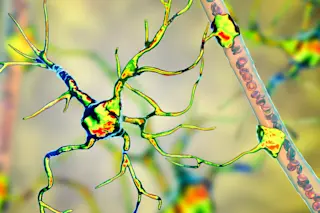When CRISPR was first introduced as a gene-editing tool in 2012, the world was in awe of all the possibilities it held — eventually earning its discoverers the Nobel Prize in Chemistry in 2020. Now, after years of refining the technology and running clinical trials, gene-editing has taken a major leap toward personalized medicine.
As Kiran Musunuru, professor of Translational Research in Penn’s Perelman School of Medicine, put it in a press statement, “The promise of gene therapy that we’ve heard about for decades is coming to fruition, and it’s going to utterly transform the way we approach medicine.”
Musunuru and a team from the Children’s Hospital of Philadelphia and Penn Medicine have successfully treated a baby boy with a rare metabolic disorder using personalized CRISPR therapy. Their case study, published in The New England Journal of Medicine, demonstrates the powerful potential of precision gene editing for rare diseases.
A Child Living With a Rare Disease
Ironically, rare genetic diseases aren’t as uncommon as they sound. In the U.S., about 1 in 10 people live with a rare disorder. What makes them “rare” is that each individual condition typically affects fewer than 2,000 people, making research and treatment development incredibly challenging.
One of those affected is KJ. He was born with CPS1 deficiency, a urea cycle disorder caused by the absence of a key enzyme the body needs to eliminate ammonia — a toxic byproduct of protein metabolism. Since liver transplants aren’t viable until patients are older, this condition carries a 50 percent mortality rate in early infancy.
Fortunately, Musunuru and Rebecca Ahrens-Nicklas, director of the Gene Therapy for Inherited Metabolic Disorders Frontier Program (GTIMD), had been studying this class of disorders for years and reached out to KJ’s family shortly after his diagnosis.
“We thought it was our responsibility to help our child, so when the doctors came to us with their idea, we put our trust in them in the hopes that it could help not just KJ but other families in our position,” said his mother, Nicole Muldoon in the press release.
Read More: Why Metabolisms Are Unique and Why They're Important to Your Health
CRISPR — Scissors for Your DNA
In just six months, the researchers developed a personalized treatment. In February 2025, KJ received his first infusion — a dose of CRISPR components delivered to his liver using lipid nanoparticles.
CRISPR (short for clustered regularly interspaced short palindromic repeats) acts like a smart pair of molecular scissors. In KJ’s case, it was custom-designed to find the faulty gene and fix the error — like correcting a typo in his DNA.
After receiving multiple doses, KJ has shown significant improvement. He’s now able to eat more protein and recover from everyday childhood illnesses without the dangerous ammonia buildup that once threatened his life. Even better, he’s had no serious side effects from the treatment.
“While KJ will need to be monitored carefully for the rest of his life, our initial findings are quite promising,” added Ahrens-Nicklas.
Expanding Success to More Patients
This breakthrough builds on years of foundational research and collaboration. For KJ and his family, the little boy's seemingly endless hospital stay now comes to end.
“We’re so excited to be able to finally be together at home so that KJ can be with his siblings, and we can finally take a deep breath,” said his father, Kyle Muldoon, in the statement.
“Years and years of progress in gene editing and collaboration between researchers and clinicians made this moment possible, and while KJ is just one patient, we hope he is the first of many to benefit from a methodology that can be scaled to fit an individual patient’s needs,” added Ahrens-Nicklas.
This case offers a hopeful path forward — one where gene-editing may now fulfill its bright promise to save patients with no other treatment options.
This article is not offering medical advice and should be used for informational purposes only.
Read More: CRISPR Eliminates Targeted Tumors by 50 Percent
Article Sources
Our writers at Discovermagazine.com use peer-reviewed studies and high-quality sources for our articles, and our editors review for scientific accuracy and editorial standards. Review the sources used below for this article:
Jackson Laboratory: What Is CRISPR?
Karolinska Institutet: More and more people with unusual diseases are diagnosed
New England Journal of Medicine: Patient-Specific In Vivo Gene Editing to Treat a Rare Genetic Disease















